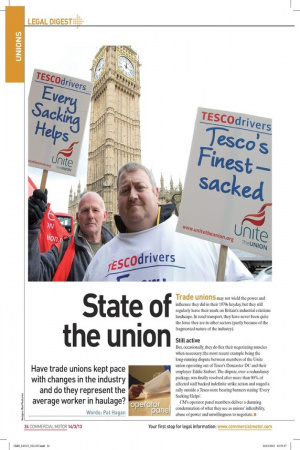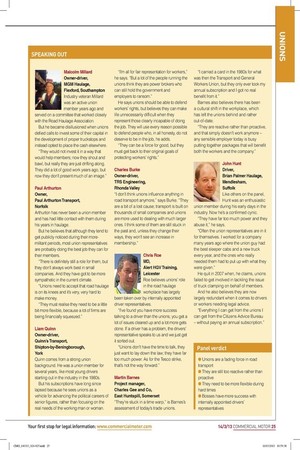State of the union St act ve Have trade unions
Page 13

Page 14

If you've noticed an error in this article please click here to report it so we can fix it.
kept pace with changes in the industry and do they represent the average worker in haulage?
Words: Pat Hagan Trade unions may not wield the power and influence they did in their 1970s heyday, but they still regularly leave their mark on Britain's industrial relations landscape. In road transport, they have never been quite the force they are in other sectors (partly because of the fragmented nature of the industry).
But, occasionally, they do flex their negotiating muscles when necessary; the most recent example being the long-running dispute between members of the Unite union operating out of Tesco's Doncaster DC and their employer Eddie Stob art. The dispute, over a redundancy package, was finally resolved after more than 90% of affected staff backed indefinite strike action and staged a rally outside a Tesco store bearing banners stating 'Every Sacking Helps'.
CM's operator panel members deliver a damning condemnation of what they see as unions' inflexibility, abuse of power and unwillingness to negotiate. • Malcolm Millard Owner-driver, MGM Haulage, Flexford, Southampton Industry veteran Millard was an active union member years ago and served on a committee that worked closely with the Road Haulage Association.
But he became disillusioned when unions defied calls to invest some of their capital in the development of proper truckstops and instead opted to place the cash elsewhere.
"They would not invest it in a way that would help members; now they shout and bawl, but really they are just drifting along. They did a lot of good work years ago, but now they don't present much of an image."
Paul Arthurton Owner, Paul Arthurton Transport, Norfolk Arthurton has never been a union member and has had little contact with them during his years in haulage.
But he believes that although they tend to get publicly noticed during their moremilitant periods, most union representatives are probably doing the best job they can for their members.
"There is definitely still a role for them, but they don't always work best in small companies. And they have got to be more sympathetic in the current climate.
"Unions need to accept that road haulage is on its knees and it's very, very hard to make money.
"They must realise they need to be a little bit more flexible, because a lot of firms are being financially squeezed."
Liam Quinn Owner-driver, Quinn's Transport, Shipton-by-Beningborough, York Quinn comes from a strong union background. He was a union member for several years, like most young drivers starting out in the industry in the 1980s.
But his subscriptions have long since lapsed because he sees unions as a vehicle for advancing the political careers of senior figures, rather than focusing on the real needs of the working man or woman. "I'm all for fair representation for workers," he says. "But a lot of the people running the unions think they are power brokers who can still hold the government and employers to ransom."
He says unions should be able to defend workers' rights, but believes they can make life unnecessarily difficult when they represent those clearly incapable of doing the job. They will use every reason possible to defend people who, in all honesty, do not deserve to be in the job, he adds.
"They can be a force for good, but they must get back to their original goals of protecting workers' rights."
Charles Burke Owner-driver, TRS Engineering, Rhonda Valley "I don't think unions influence anything in road transport anymore," says Burke. "They are a bit of a lost cause; transport is built on thousands of small companies and unions are more used to dealing with much larger ones. I think some of them are still stuck in the past and, unless they change their ways, they won't see an increase in membership."
Chris Roe MD, Alert HGV Training, Leicester Roe believes unions' role in the road haulage workplace has largely been taken over by internally appointed driver representatives.
"I've found you have more success talking to a driver than the unions; you get a lot of issues cleared up and a lot more gets done. If a driver has a problem, the drivers' representative speaks to us and we just get it sorted out.
"Unions don't have the time to talk, they just want to lay down the law; they have far too much power. As for the Tesco strike, that's not the way forward."
Martin Barnes Project manager, Charles Gee and Co, East Huntspill, Somerset "They're stuck in a time warp," is Barnes's assessment of today's trade unions. "I carried a card in the 1980s for what was then the Transport and General Workers Union, but they only ever took my annual subscription and I got no real benefit from it."
Barnes also believes there has been a cultural shift in the workplace, which has left the unions behind and rather out-of-date.
"They are reactive rather than proactive, and that simply doesn't work anymore any sensible employer today is busy putting together packages that will benefit both the workers and the company."
John Hunt Driver, Brian Palmer Haulage, a 0; Mendlesham, Suffolk Like others on the panel, *4411■16.— Hunt was an enthusiastic union member during his early days in the industry. Now he's a confirmed cynic.
"They have far too much power and they abuse it," he says.
"Often the union representatives are in it for themselves. I worked for a company many years ago where the union guy had the best sleeper cabs and a new truck every year, and the ones who really needed them had to put up with what they were given."
He quit in 2007 when, he claims, unions failed to get involved in tackling the issue of truck clamping on behalf of members.
And he also believes they are now largely redundant when it comes to drivers or workers needing legal advice.
"Everything I can get from the unions I can get from the Citizens Advice Bureau without paying an annual subscription."
Panel verdict • Unions are a fading force in road transport • They are still too reactive rather than proactive • They need to be more flexible during hard times • Bosses have more success with internally appointed drivers' representatives






































